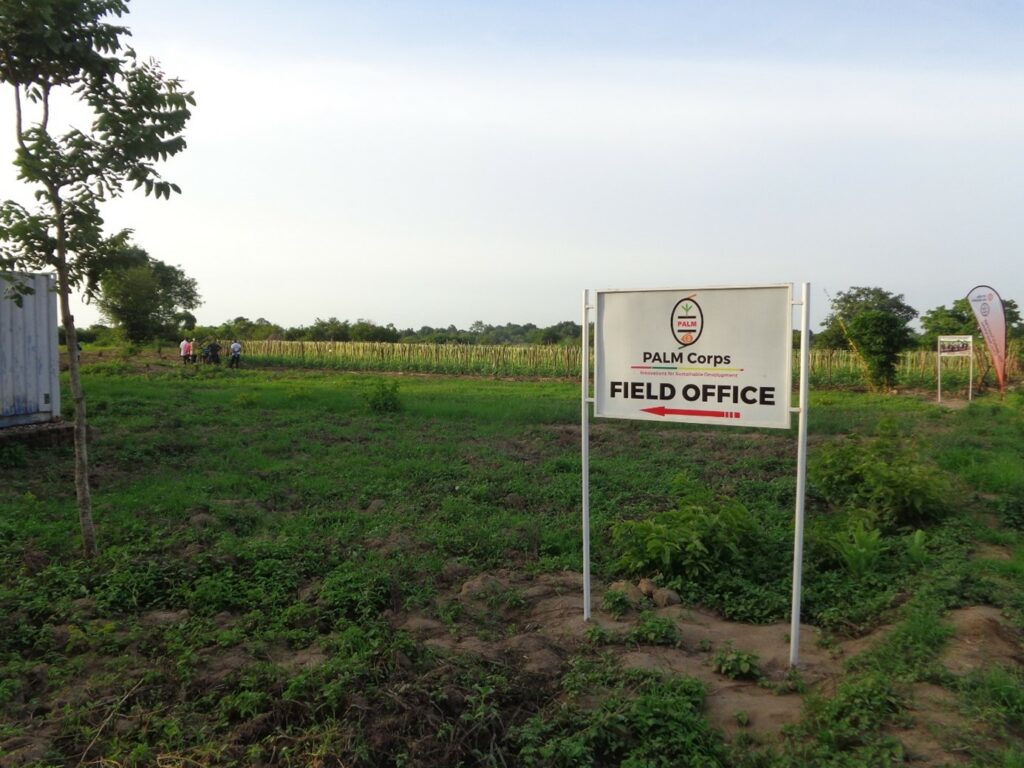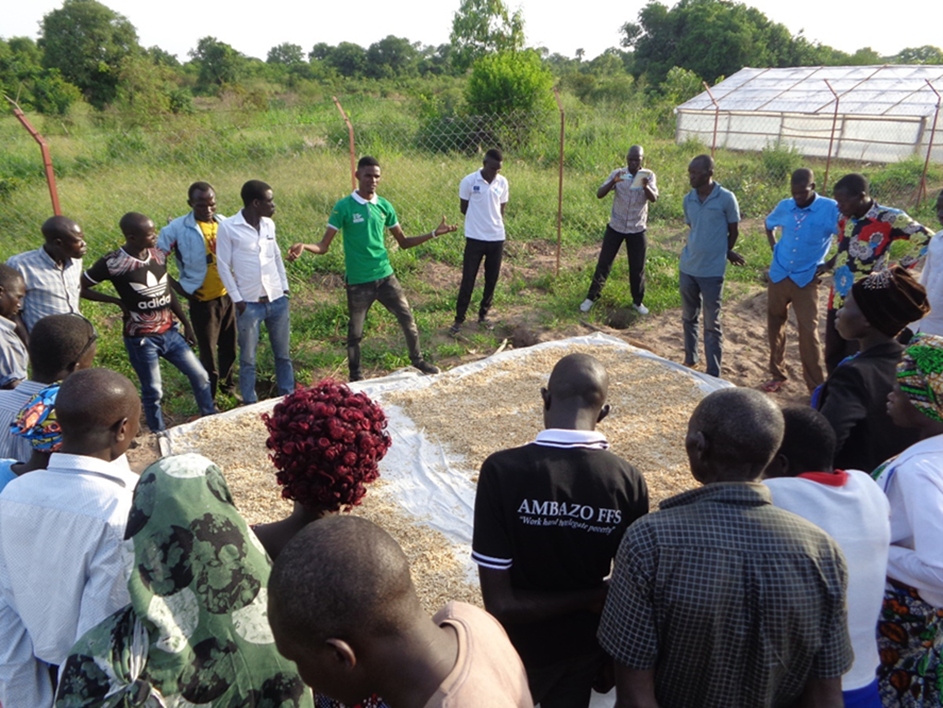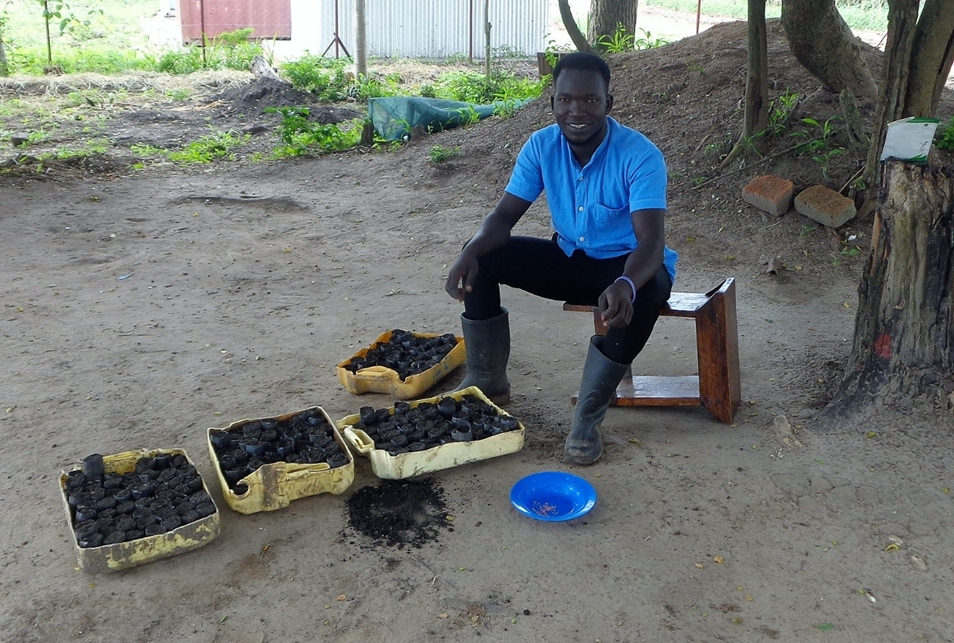Make Your Experiences Count. They Can Change the World.
LET’S BRING ALL OF OUR KNOWLEDGE AND EXPERIENCES TOGETHER.
TOGETHER WE KNOW MORE. TOGETHER WE ACHIEVE MORE. TOGETHER WE DO BETTER.
LET’S BRING ALL OF OUR KNOWLEDGE AND EXPERIENCES TOGETHER.
TOGETHER WE KNOW MORE. TOGETHER WE ACHIEVE MORE. TOGETHER WE DO BETTER.
Published: August 18, 2022
“This place… is just good.” Safi Alli enjoys his job as Centre Manager at the PALM Corps field office in Siripi, Rhino Camp Refugee Settlement, because it is an opportunity to live and work the way he likes: As a constantly busy practitioner rather than a desk-bound NGO officer. He loves the physical aspects of keeping the field office, which includes a number of agricultural demonstration sites, running. “When you sweat in the morning, it keeps you healthy, you breathe fresh air.” But also, importantly, it allows him and his colleagues to share the life and experiences of those people they are supposed to work with: Refugee and host communities that live off the often scarce and unproductive land in the settlement. For Safi, the benefits are clear: “you live with the community, you see what is happening and you are able to address the problems together with them”.

PALM Corps’ field office was established in 2019 to serve as a hub for the organization’s projects in the Rhino Camp and Imvepi refugee settlements. Refugees in this region of the country are predominantly people who have fled from the ongoing conflicts in South Sudan. When one thinks of large groups of refugees in Europe, fences, crowded camps and veritable tent cities come to mind. In Uganda, however, the defining word is “settlement”, rather than “camp”, meaning that there is no immediate way to differentiate these areas from other villages or communities. There is also no clear separation between communities or removal of refugees from the rest of Ugandan society.
As of June 2022, Rhino and Imvepi are host to around 135’000 and just below 60’000 refugees respectively– and also to a large population of Ugandans living side-by-side with them. This means that movement in and out of the areas is free for humanitarian and development actors. It also means, that projects generally need to target all the inhabitants of the settlements – refugee and national – as they face similar and related challenges of making a livelihood in a remote and often neglected part of the country.

There are numerous international and national organizations active in the settlements and generally their field offices are located in a central part of the settlement that is called the “base camp”. Here organizations can be allocated their space to have – depending on their specific needs – staff housing or storages. According to Abbey Anyanzo Thomas, PALM Corps’ Executive Director, however, this was just not the way to go for a locally based organization.
While accommodation in the base camp is temporary and can be given up when there are less projects to be carried out locally, he was deliberately looking for a more permanent home: “We are not going anywhere, we are home. The way we work, we should not work like an international organization. To the contrary, for sustainability, in the future this field office should become a home even for the internationals.” With this long-term perspective in mind, PALM Corps decided to acquire land well outside the base camp in the village of Siripi and to gradually build up its local office there.
By now the PALM Corps field office in Siripi consists of a staff house and a main office building, as well as demonstration sites and stables for the goats. For security, the compound is fenced in and guarded day and night. Although not all staff enjoy staying away from Arua, and management sometimes struggles with getting people to choose the “rural life”, some have now discovered advantages.
Since the headquarters of PALM Corps is situated around 70 kilometres away in the city of Arua, and since this is also the place where most of the staff live, getting to the settlements for fieldwork used to be a challenge, even dangerous. As Sunday Ongwech, an experienced PALM Corps Project Officer, remembers; “way back when we were travelling from Arua to Siripi, or to the field, there had been so many cases of accidents compared to the time we own the field office. Because now you are prepared, you are not tense, you are not under pressure. So, there is a way you keep focus while riding and you don’t hurry”.

Beyond the timesaving and lessened likelihood of being insured or even killed riding a motorbike on the roads, there is also an important element of being seen as part of the community. For Sunday, this is evident in things such as dealing with the rising food prices that are currently on everybody’s mind: “Overall, staying there has made people see us as their own. Because now we are also facing the same dilemmas they are in. We all buy food from the same market they are buying. We understand what they go through.”
Both in one’s daily life and in dealing with doing agriculture under difficult circumstances, it is exactly this ability to speak from experience that is key to Safi Alli: “What makes you a better person, better at our job, is when you practice. If someone tells you there is drought, you know by yourself because you go through it. But if someone says there is drought but you don’t practice, you can’t know until you experience it. So, when you live here, you tend to think together with the farmers.”

For Executive Director Abbey, the plan was always to have the field office also serve as a demonstration site for the local agricultural community. PALM Corps’ mission is to be innovative with the agricultural practices, to find out what works best for the region and to provide tailor-made solutions based on the local context.
Many parts of the Westnile Region of Northern Uganda face similarly challenging conditions to those found in Siripi. By focusing on what works locally and testing it on-site, according to Abbey, “you are generating knowledge which will be applied to this big chunk of land, from Pakwach up to Adjumani which have that same characteristic: They are hot, poor vegetation, in some places rocky”. The field office is therefore an important calling card for the organization and for good agricultural practices more generally. The tomato field next to the road – tended to by a youth farmer group under a project by PALM Corps and the Spanish NGO Ayuda en Accion – gets much attention from passers-by and the local community.
Sometimes the proximity to the community also has unexpected positive outcomes. Victor Alioni, a scientist and local agribusiness entrepreneur came to the field office because he saw the good work one agricultural project did near his residence. “I happen to be a neighbor with some of the youth projects being done. And then, you know, I followed the tracks backwards until I found a resource center here, PALM Corps”. Victor and the staff now collaborate on a trial of using earthworms to generate biofertilizers. The worm growing unit is now one more obligatory stop on a demonstration tour that also includes the numerous crops that are being grown, as well as chicken and goats.

For Safi Alli, the presence in Siripi also offers the opportunity to identify and develop “homegrown” staff – the next generation. These collaborators need little training in the culture of the organization as they have been through projects themselves. Innocent Mukele is one example of this informal talent development programme: he is a local youth who had benefitted from PALM Corps’ agricultural training and impressed the organization so much with his dedication and competence, that he was retained as a staffer. Innocent likes that innovating, trying out new things, is specifically encouraged: “The field center, I see it as being a unique place because there are facilities here for us and the field office is open to ideas. If we suggest we should do something, there is always that provision, you should try what you have come up with.”
Offering such opportunities for homegrown talent is one way that can ensure that there will always be staff willing and happy to keep things running at the field office. And with new youth joining the workforce, it becomes more and more likely that the Siripi field office could soon be led by the local PALM staffers that have made it its home and place of work. Few things could better illustrate the idea of an organization being “home”.